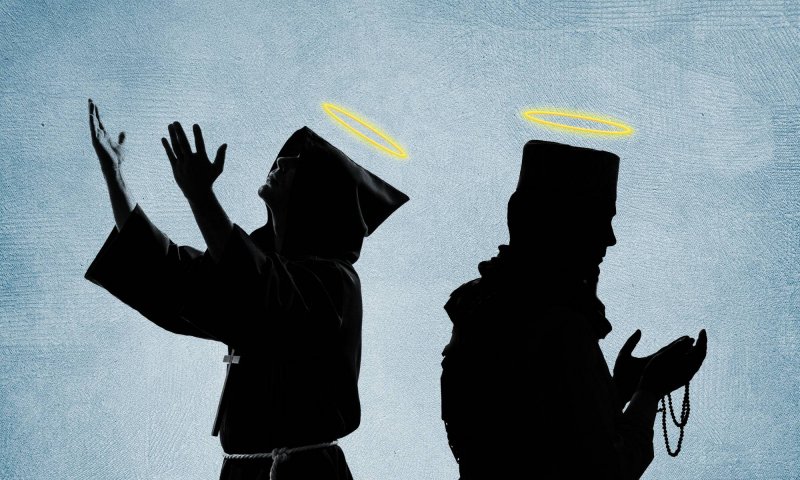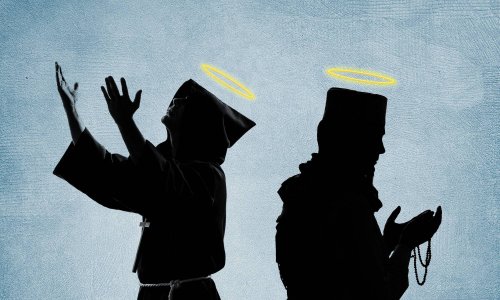“We are God’s crew, and we are certified with that” goes a shaabi Egyptian song. The lyrics satirically highlight the untouchability of religious elites. Notwithstanding, a video was edited to have the faces of religious scholars dancing to the song, an act of rebellion against the monopoly of religion, both its ideology and its clergy. In Egypt, anyone who dares sing outside the choir is accused of apostasy. Or worse.
Asma Mounir, the daughter of a famous Egyptian actor, is now in hiding. She received death threats for expressing her disdain of Sheikh Metwally Al-Shaarawy’s views, a much loved leading scholar on Islam. Online debate was rife, loaded with cussing and accusations.
“Those who defended Al-Shaarawy may not agree with his views, such as how it is immoral for a woman to work or that hemodialysis is a sin but his image in the public consciousness remains unscathed”, law and religious affairs researcher Mohamed Medhat Mandour told Raseef22.
Head of the policy unit at the Egyptian Commission for Rights and Freedoms and expert on religious affairs Mina Thabet agrees. “It is cultural heritage to put a halo around certain religious figures. They become an icon that cannot be criticised,” he told Raseef22. This was mirrored by the hashtag #الشعراوي_رمز_مصر (Al-Shaarawy is Egypt’s icon), which trended on Egypt’s Twitter timeline.
Analyzing how religious icons are formed, Samuel Tadros, a senior fellow at the Hudson Institute's Center for Religious Freedom, explained that religion in general utilizes two forms to make its claim: “the transcendent and the touchable”. The former means claims of truths or mysteries above man, such as the Christian communion. But religion uses other means, those that can be felt and touched, embodied in objects or persons, and they become part of the way people understand religion. “It is human nature to need the touchable. We are not just mental creatures but also physical ones, so physical presence is required in the form of people,” Tadros said.
Islam Al-Behery questioned traditional preaching and interpretations of Islam. Among his fatwas was that non-Muslims can go to heaven, a view the majority of Muslims disagree with and is at the core of #Shaarawy’s teachings, he got 5 years jail sentence
The 2011 revolution and the high internet usage rate showed #Shaarawy's opinions are not those of a moderate Islam, his legacy started waning, but the Blasphemy Law ensures no reasonable scholar will debate any of his preaching for fear of prison
The very nature of religion itself, because it is a claim about both the intangible like God and afterlife, and the absolute, such as truth and ethics, explained Tadros. “It is viewed by men as above humans,” he said.
Second, in the Middle East specifically, religious claims have not been seriously challenged the way they were in the West, where religion was forced to adapt, Tadros said.
Thirdly, “the state uses religion as a tool to mould consciousness and public opinion,” Thabet maintained.
Religion is the prop when the state fails at bringing about achievements, said Mandour, further expounding that “when the state withdraws parts of its infrastructural economic support like jobs and food, it invests in the superstructure to anesthetize people and have them accept the bad status-quo”.
Regimes also appeal to religion for legitimization. To legitimize the military take over in June 2013, the Coptic Pope Tawadros II, and Grand Imam of al-Azhar Ahmed el-Tayeb appeared in the media right next to politicians. Similarly, religion was exploited during the Iraq War in 1990. When the Egypt stated wanted to deploy soldiers to help Kuwait, recalled Thabet, “rather than, for example, telling them this fight is for the interest of the country, or that it is a political decision made by the president”, it brought them sheikhs to quote the Quraan saying ‘And if two factions among the believers should fight, then make settlement between the two’ (49:9).
None of Presidents Gamal Abdel Nasser, Anwar Al-Sadat, Hosni Mubarak or Abdel Fattah Al-Sisi are secular men, Tadros said. “They, [each] in their own way, wanted and needed religious legitimization of their rule,” he stated.
Not only does the state view religion in utilitarian terms, but it creates its own version of the “correct” religion, Mandour said. Al-Shaarawy and other religious icons are branded and used to disseminate this “correct” interpretation. It becomes part of an Egyptian's identity, and an instrument of othering. Critiquing it translates into critiquing a major part of the personality, and desperate self-defence as a result, said Mandour.
Al-Shaarawy used a simple Egyptian (ammeyya) dialect, appealing in a comprehensible way to the masses. The state gave him prime-time TV slots during an era when TV was King to debate relevant issues. Al-Shaarawy issued opinions such as God ordered men to beat their wives when needed, a person who does not pray should be killed, and organ donation is sinful.
“Extremism was normalized in public consciousness for years. So when people hear a discourse other than what they consider normal, the person of a different opinion becomes the abnormal,” Thabet emphasized. Yet Shaarawy is an embodiment of what is regarded as the “moderate Muslim Egyptian”, Abdallah Hendawy, Sociology Professor at George Mason University told Raseef22. “Egyptians find comfort in religion,'' said Handawy. “They defend religious icons much more than political ones. It is easier to have a political revolution in Egypt than to have a religious revolution,” he believes.
Another reason why religion became a taboo in Egypt is the need for stability. “With people losing faith in institutions because of corruption, or because they don’t represent them, religious institutions remain the only ones they can trust,” Tadros said. He added that people need anchors of stability, constants, truths in their lives, and “[religious icons] are their anchors of stability. There are already too many variables in daily life”.
“The problem with admitting that spiritual leaders like Al-Shaarawy or Pope Shenouda are wrong is that it opens a dangerous door that people would rather keep closed”, Tadros said, “Who would be next?... It means putting all that is supposedly absolute to human tests”.
Discourse becomes near impossible when you factor in these variables. Islamic researcher and TV host Islam Al-Behery, whose opinions stirred controversy, and eventually he was charged with “contempt of Islam” and sentenced to five years in prison in 2015. The channel which aired his program said it suspended the program “to defend the national interest, out of respect for a large segment of society and in response to the request of the grand sheikh of al-Azhar.”
Al-Behery questioned traditional preaching and centuries-old interpretations of Islam. Among his controversial fatwas was that non-Muslims also go to heaven. This view contests the majority of Muslims’, and is at the core of Al-Shaarawy’s teachings.
With the onset of the January 2011 revolution came challenge minds and cynicism. The internet transformed how knowledge is gathered. Surely, videos of Al-Shaarawy’s opinions bubbled up. “Some people became aware of the lie that is his branding as a moderate Islamic scholar,” said Thabet. Tadros notes that change can be observed in the way the legacy of Pope Shenouda is being contested.
Nonetheless, the mainstream clings to old taboos, Tadros stated. “[Pope Shenouda] was not a brilliant theologian. He was actually a very bad one. But he was a brilliant simplifier who explained big ideas in simple words. So he was a man of the masses,” held Tadros.
Ignorance weighs in on intolerance of the other, whether the other is an opinion or a person. The experts Raseef22 interviewed agree that Egypt’s educational system does not allow for independent thinking, nor does it include learning about different religions within other cultures.
Meanwhile, there is a systematic, legal hindrance to religious freedom of expression in Egypt, asserted Mandour. Because of Article 98W of the Penal Code, known as the Blasphemy Law, numerous researchers and writers fear discussing different ideas, or have a limit to what they can say. The law uses elusive language to punish “whoever misuses religion... to harm the national unity and social coherence”.
In 1992, Professor Farag Fouda was assassinated after a committee of clerics at al-Azhar accused him of blasphemy. Fouda’s writings had been critical of the growing influence of Islamists and Islamic Fundamentalism in Egypt.
“In a perfect world people can form a balanced view, understanding a [person’s] complexities,'' Tadros said. “But in our world, in our Egypt, [things] can either be black or white”.
Tadros posed a pivotal question: “If God himself gave me freedom to reject Him, how on earth should I or anyone else take that freedom away?”
Raseef22 is a not for profit entity. Our focus is on quality journalism. Every contribution to the NasRaseef membership goes directly towards journalism production. We stand independent, not accepting corporate sponsorships, sponsored content or political funding.
Support our mission to keep Raseef22 available to all readers by clicking here!
Interested in writing with us? Check our pitch process here!






